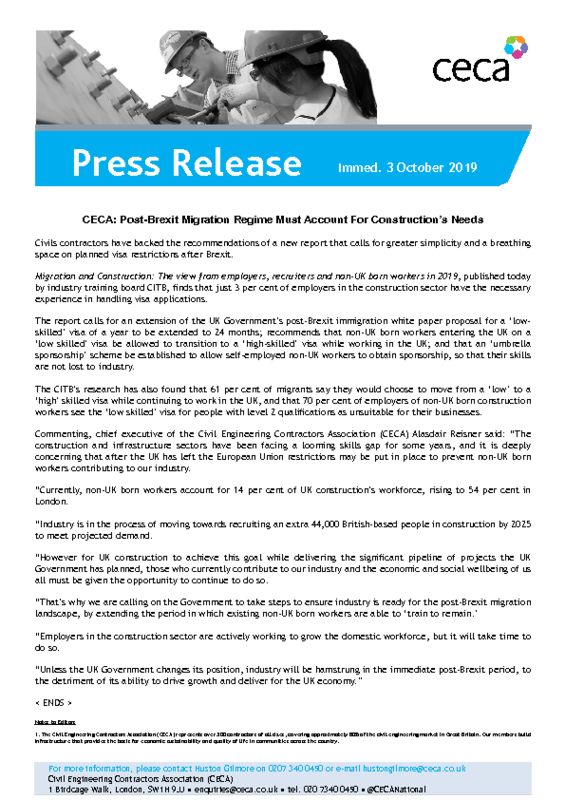Civils contractors have backed the recommendations of a new report that calls for greater simplicity and a breathing space on planned visa restrictions after Brexit.
Migration and Construction: The view from employers, recruiters and non-UK born workers in 2019, published today by industry training board CITB, finds that just 3 per cent of employers in the construction sector have the necessary experience in handling visa applications.
The report calls for an extension of the UK Government’s post-Brexit immigration white paper proposal for a ‘low-skilled’ visa of a year to be extended to 24 months; recommends that non-UK born workers entering the UK on a ‘low skilled’ visa be allowed to transition to a ‘high-skilled’ visa while working in the UK; and that an ‘umbrella sponsorship’ scheme be established to allow self-employed non-UK workers to obtain sponsorship, so that their skills are not lost to industry.
The CITB’s research has also found that 61 per cent of migrants say they would choose to move from a ‘low’ to a ‘high’ skilled visa while continuing to work in the UK, and that 70 per cent of employers of non-UK born construction workers see the ‘low skilled’ visa for people with level 2 qualifications as unsuitable for their businesses.
Commenting, chief executive of the Civil Engineering Contractors Association (CECA) Alasdair Reisner said: “The construction and infrastructure sectors have been facing a looming skills gap for some years, and it is deeply concerning that after the UK has left the European Union restrictions may be put in place to prevent non-UK born workers contributing to our industry.
“Currently, non-UK born workers account for 14 per cent of UK construction’s workforce, rising to 54 per cent in London.
“Industry is in the process of moving towards recruiting an extra 44,000 British-based people in construction by 2025 to meet projected demand.
“However for UK construction to achieve this goal while delivering the significant pipeline of projects the UK Government has planned, those who currently contribute to our industry and the economic and social wellbeing of us all must be given the opportunity to continue to do so.
“That’s why we are calling on the Government to take steps to ensure industry is ready for the post-Brexit migration landscape, by extending the period in which existing non-UK born workers are able to ‘train to remain.’
“Employers in the construction sector are actively working to grow the domestic workforce, but it will take time to do so.
“Unless the UK Government changes its position, industry will be hamstrung in the immediate post-Brexit period, to the detriment of its ability to drive growth and deliver for the UK economy.”
< ENDS >


